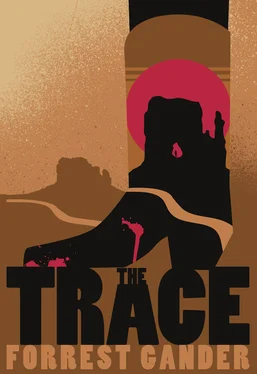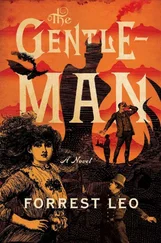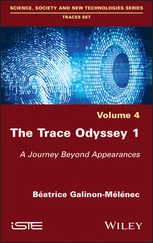Forrest Gander - The Trace
Здесь есть возможность читать онлайн «Forrest Gander - The Trace» весь текст электронной книги совершенно бесплатно (целиком полную версию без сокращений). В некоторых случаях можно слушать аудио, скачать через торрент в формате fb2 и присутствует краткое содержание. Год выпуска: 2014, Издательство: New Directions, Жанр: Современная проза, на английском языке. Описание произведения, (предисловие) а так же отзывы посетителей доступны на портале библиотеки ЛибКат.
- Название:The Trace
- Автор:
- Издательство:New Directions
- Жанр:
- Год:2014
- ISBN:нет данных
- Рейтинг книги:3 / 5. Голосов: 1
-
Избранное:Добавить в избранное
- Отзывы:
-
Ваша оценка:
- 60
- 1
- 2
- 3
- 4
- 5
The Trace: краткое содержание, описание и аннотация
Предлагаем к чтению аннотацию, описание, краткое содержание или предисловие (зависит от того, что написал сам автор книги «The Trace»). Если вы не нашли необходимую информацию о книге — напишите в комментариях, мы постараемся отыскать её.
The Trace — читать онлайн бесплатно полную книгу (весь текст) целиком
Ниже представлен текст книги, разбитый по страницам. Система сохранения места последней прочитанной страницы, позволяет с удобством читать онлайн бесплатно книгу «The Trace», без необходимости каждый раз заново искать на чём Вы остановились. Поставьте закладку, и сможете в любой момент перейти на страницу, на которой закончили чтение.
Интервал:
Закладка:
The Firing
At eleven p.m., Tuesday before her trip, Hoa met her firing partner, Veena, at Studio Clay Co-op. They passed through the gallery space into the common room, its dusty tables strewn with sets of pottery waiting to be glazed or painted — plates, dishes, vases, sake cups. In the individual studios constellated around the common room, sculptural work was drying under polyurethane sheets. They exited the back of the building and let themselves through the locked gate into the kiln complex, a fenced-in, weedy, open-air acre of trees and sheds and piles of all sorts of things — stacked pine and poplar, mill scraps, salvaged sewer caps. Over the kilns, rudimentary tin roofs were pierced by tall chimneys.
Talking softly, Veena and Hoa walked through an inner courtyard, where six long clay-mixing tanks resembled eerie sarcophagi in the moonlight. They ducked under the tin roof, stepping onto the concrete platform of the kiln. It was a small downdraft style, its door already bricked and mudded. A yellow electrical wire led from a thermocouple inside the kiln to a pyrometer set up on a dirty wooden stool.
Veena squatted and removed two bricks from the wall of the ashpit below the kiln while Hoa went through two cribs of dry-wood edgings. She picked a few of the thinnest ones and slid them across the concrete floor toward Veena, now leaning forward from her stool in front of the kiln. Veena placed the edgings over a bed of scrolled newspaper in the ashpit. She lit the paper, adjusting the wood in the flame. As it began to take, she tossed on strips of bark.
The fire rose from the ashpit through the grate into the firebox, and they continued to add thin wood. After two hours, the pyrometer registered 435 degrees, and Veena blocked the mouth to the ashpit with two bricks, opening the firebox door above the grate. Hoa shoved two-foot lengths of cut pine into the firebox.
Now the lengths of wood fell into a conflagration already roaring upward, and as Hoa added more split pine, it swelled the firebox, was sucked through two draft holes, and shot up along the interior kiln walls. Hoa kept adding edgings as the fire vaulted up to the cat arch where, given nowhere else to go, it turned downward into the center of the kiln, passing over shelves of clay pieces before it was siphoned out through a low exit damper in back.
Five hours after first lighting the crumpled newspaper, Hoa and Veena were moving with an incredible mutuality. Hoa lifted and slid the heavy iron door of the firebox and shoved four more thick staves and four thin ones into the crackling fire. With her mitted hand, she slid the door back and shut it again over the firebox mouth. Veena leaned against the wood stack, and Hoa sat on the stool in front of the kiln. Both turned their gazes toward the pyrometer. They were working smoothly as a team, like dancers alternating the lead, talking about slips and glazes, Veena’s fiancé, common friends. Slapping mosquitoes.
Sliding aside the door again, Veena forced five thick and five thin lengths of wood into the firebox. One jammed, and she batted it with the butt of another until both fell into the flames. The wood crackled prophetically. She slid the heavy firebox door closed; they sat in silence as the temperature rose into the end of the stoke, and then Hoa took the pyrometer read. Pungent smoke circled up under the tin roof, mixing with the incense Hoa had set in clay balls on the floor to discourage mosquitos.
Veena arranged the next round of split wood upright against the side of the kiln.
“What have you been stoking?”
“My last one was five-five,” Hoa answered, penciling notations in the record book.
Then they heard a different kind of crack from inside the kiln, and two more. Simultaneously, both of their bodies went rigid. Three muted clay explosions. Veena’s eyes widened as they caught Hoa’s.
“It isn’t your piece,” Hoa said.
She squeezed herself between the stack of wood and the side of the radiant kiln, reaching down carefully to take a brick from the side hole. On the other side of the kiln, Veena was doing the same.
Then both of them were standing shoulder to shoulder like mourners behind the stoking stool, looking at the pyrometer.
“I think it’s mine,” Hoa said. “The thickness was uneven.”
“It’s too late anyway,” Veena answered.
Mosquitos swarmed them as the air went dead. The kiln blared its outrageous heat. Hoa put on her welder’s goggles, stepping up on the stool to check the peephole.
“Maybe it was the clay wads,” she said.
A Vision
There was an occasional pip from the mud nests glommed to the ceiling of the cave. Then when an adult swallow shot inside from the world of light, there was a choral explosion of cheeping. One of the nestlings fell from its mud cup into the spatter cone of birdlime and broken eggshells on the rock floor. Dale was aware of this as he slept. Sometime later, he was aware of the injured chick stumping toward him, using its wings as props, its disproportionately large, naked head skewed to one side of the scrawny neck, dragging. It came on slower and slower until it stopped, near him, along the wall of the cave.
Dale could see with an incredible vividness through his eyelids. Now in the half-light, he watched a fly tamping around in the opaque eye of the dead chick. The fly was testing the inner edge of the eye with its foreleg, turning and dipping its bristled abdomen into the eyeball’s seam. Then there were more flies on the bird’s corpse. Surveying its head, walking the rim of the eye and beak, fussing and fusing with each other. And the dead bird’s oversized eye was glazed with clots of eggs.
He thought, They’ll know I’m dead before I know. The flies.
Above him, swallows swooped in and out through the cave mouth, making pithy calls, pwid, pwid. Dale considered what they were saying, his mind weightless and clear above his body.
In the darkness of the wall to his left, Dale came to notice, without turning his head, a strange, patterned bulge, like a woven bag stuffed into a nook. He was beginning to be able to put his thirst away into a pocket of his dormant body, in order that he might observe the plight of everything animate and inanimate around him. I’ll sit here a while longer, he thought. Until it’s easier to breathe. His ankle was numb now. His whole body was numb.
Then the swallows went quiet.
Without moving his head, he swerved his eyes toward the bulge in the cave wall. It transfixed him. He could sense it pulsing, faintly glowing, its dark diamond patterns dimming and resetting in shadow. Two crickets deeper into the cave called and answered, answered and called. Was it night? Something was eating its way out of his own eye-pits. He could no longer see, but his mind worked like a radar system. He could perfectly track one cricket approaching the other. When they met against the rock, he could sense their antennal fencing.
He thought of Hoa walking ahead on the trail, walking alone toward the highway to get help. Then the heaviness of his body began to return to him. He struggled to find the way back to himself. She was alone and in trouble, and he could not help. He was useless as a horse on its side. She had added to his life, over and over, moments of recognition. As he stood up in her. As she swandived into him. All these years together, and everything he had learned about love before and during their marriage, he had learned in order to love her.
He recalled Hoa’s peculiar knack for putting away anything he happened to be using when they were home. He would take down a wine glass, step around the counter, reach for a bottle of wine from the rack, and she would charge into the kitchen, put the wine glass back in the cabinet, and start talking to him about something. There might be a stack of dishes at the sink, but the only thing she would touch was the thing he had just set there to use.
Читать дальшеИнтервал:
Закладка:
Похожие книги на «The Trace»
Представляем Вашему вниманию похожие книги на «The Trace» списком для выбора. Мы отобрали схожую по названию и смыслу литературу в надежде предоставить читателям больше вариантов отыскать новые, интересные, ещё непрочитанные произведения.
Обсуждение, отзывы о книге «The Trace» и просто собственные мнения читателей. Оставьте ваши комментарии, напишите, что Вы думаете о произведении, его смысле или главных героях. Укажите что конкретно понравилось, а что нет, и почему Вы так считаете.












